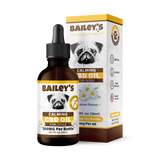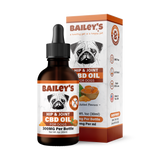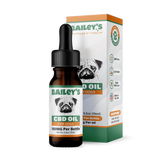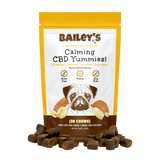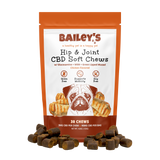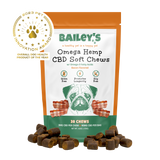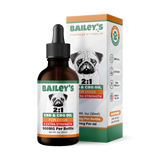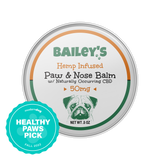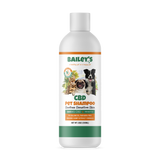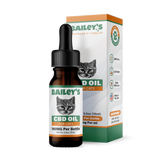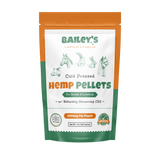Guava and Dogs: Health Considerations

Guava is a delicious tropical fruit that is enjoyed by many, but is it safe for dogs to eat? With guidance from the friendly team at Bailey’s CBD , we will investigate the nutritional value of guava, potential health benefits for dogs, risks and precautions to consider, how to introduce guava into your dog's diet, and the importance of consulting with a vet. Let's dive in and learn more about guava and its implications for your furry friend's health.

Table of Contents
1. Understanding the Nutritional Value of Guava
Guava is known for its rich nutritional profile, making it a popular choice among health-conscious individuals. When it comes to dogs, it is important to understand the vitamins, minerals, and fiber content that guava offers.
Guava, a tropical fruit with a unique flavor and aroma, is not only delicious but also packed with essential nutrients that can benefit both humans and dogs. Let's explore the vitamins, minerals, and fiber content in guava in more detail.
1.1 Vitamins and Minerals in Guava
Guava is a powerhouse of essential vitamins and minerals that are beneficial for both humans and dogs alike. One of the standout nutrients in guava is vitamin C. Just one serving of guava provides a significant amount of vitamin C, which supports immune function and helps the body fight off infections. This vitamin is particularly important for dogs, as it helps boost their immune system and keep them healthy.
In addition to vitamin C, guava also contains vitamin A, another vital nutrient for dogs. Vitamin A promotes healthy vision and skin, ensuring that your furry friend's eyesight remains sharp and their coat stays shiny and healthy.
When it comes to minerals, guava is a true treasure trove. Potassium, a mineral essential for maintaining proper cardiac function and supporting the nervous system, is abundant in guava. This mineral plays a crucial role in regulating heart rhythm and ensuring the smooth transmission of nerve signals throughout the body. Calcium, iron, and magnesium are also present in guava, contributing to overall health and well-being in dogs.
1.2 Fiber Content in Guava
Fiber is an essential component of a balanced diet, and guava is an excellent source of dietary fiber. This fruit contains both soluble and insoluble fiber, which can have numerous benefits for your furry companion's digestive health.
Let's start with soluble fiber. Guava is rich in this type of fiber, which dissolves in water and forms a gel-like substance in the digestive tract. Soluble fiber helps regulate blood sugar levels, making it particularly beneficial for dogs with diabetes or those prone to blood sugar imbalances. By slowing down the absorption of glucose, soluble fiber helps prevent spikes and crashes in blood sugar levels, promoting overall stability and well-being.
On the other hand, guava also provides a good amount of insoluble fiber. This type of fiber adds bulk to the stool, promoting regular bowel movements and preventing constipation in dogs. By keeping the digestive system running smoothly, insoluble fiber supports optimal gut health and can help prevent gastrointestinal issues.
Guava is not only a delicious tropical fruit but also a nutritional powerhouse for both humans and dogs. Its high vitamin C and A content, along with a range of essential minerals, make it a valuable addition to your furry friend's diet. Furthermore, the fiber content in guava can support digestive health and contribute to overall well-being. So, next time you enjoy a juicy guava, consider sharing a small piece with your four-legged companion and let them benefit from its nutritional goodness!
2. Potential Health Benefits of Guava for Dogs
Guava, a tropical fruit known for its sweet and tangy flavor, not only makes a delicious snack for humans but also offers numerous health benefits for our furry friends. While it's important to remember that dogs have different nutritional needs than humans, incorporating guava into their diet can provide several potential health benefits. Let's explore some of the ways guava can positively impact your dog's well-being.
2.1 Digestive Health and Guava
The fiber content in guava makes it an ideal choice for promoting digestive health in dogs. Fiber plays a crucial role in maintaining a healthy gastrointestinal system by aiding in proper digestion and preventing constipation. By adding guava to your dog's diet, you can help ensure regular bowel movements and contribute to overall gut health.
Furthermore, guava contains natural enzymes that can assist in breaking down food and improving nutrient absorption. This can be particularly beneficial for dogs with sensitive stomachs or those prone to digestive disorders. By incorporating guava into their meals, you can provide them with a natural digestive aid and potentially reduce the occurrence of gastrointestinal issues.
2.2 Immune System Boost from Guava
As mentioned earlier, guava is a rich source of vitamin C, which plays a crucial role in boosting the immune system. Vitamin C is known for its antioxidant properties, which help protect cells from damage caused by harmful free radicals. By incorporating guava into your dog's diet, you can enhance their immune response, helping them stay healthy and ward off infections.
In addition to vitamin C, guava also contains other essential nutrients that support a strong immune system. These include vitamins A and E, as well as minerals like potassium and magnesium. By providing your dog with a well-rounded diet that includes guava, you can help strengthen their immune system and improve their overall well-being.
It's worth noting that while guava can offer potential health benefits for dogs, it should always be given in moderation and as part of a balanced diet. As with any new food introduction, it's important to monitor your dog's reaction and consult with a veterinarian if you have any concerns or questions.
3. Risks and Precautions when Feeding Guava to Dogs
3.1 Possible Allergic Reactions
While guava is generally safe for dogs to consume, it is important to be mindful of potential allergic reactions. Some dogs may be allergic to guava or any other fruit. If you notice any signs of an allergic reaction, such as itching, rashes, or gastrointestinal upset, discontinue feeding guava and consult your vet.
It is worth noting that allergic reactions to guava in dogs are relatively rare. However, it is always better to err on the side of caution and monitor your dog closely after introducing any new food into their diet. Allergies can develop over time, so even if your dog has had guava before without any issues, it is still possible for an allergic reaction to occur in the future.
If you suspect that your dog may be allergic to guava, it is recommended to consult with your veterinarian. They can perform tests to determine if your dog has an allergy and provide guidance on how to manage it.
3.2 Choking Hazards and Guava Seeds
Guava seeds can present a potential choking hazard for dogs, especially small breeds or those prone to swallowing food without chewing. It is recommended to remove the seeds from guava slices before offering them to your dog. Always ensure that the pieces of guava you provide are small and easily manageable to avoid any risks.
In addition to the choking hazard, guava seeds can also cause intestinal blockages if ingested in large quantities. Dogs with a tendency to gulp down their food without chewing properly are at a higher risk. Therefore, it is crucial to supervise your dog while they are eating guava and make sure they chew it thoroughly or remove the seeds altogether.
Furthermore, guava seeds contain trace amounts of cyanide, which can be toxic to dogs in large quantities. While the amount of cyanide in guava seeds is generally not significant enough to cause harm, it is still advisable to minimize your dog's exposure to these seeds as a precautionary measure.
When feeding guava to your dog, it is best to slice it into small, bite-sized pieces. This not only reduces the risk of choking but also makes it easier for your dog to digest. By taking these precautions, you can safely incorporate guava into your dog's diet and provide them with a tasty and nutritious treat.
4. How to Safely Introduce Guava into Your Dog's Diet
Introducing new foods into your dog's diet can be an exciting and beneficial experience. One fruit that you may consider adding to their menu is guava. Not only is guava delicious, but it also offers a range of health benefits for your furry friend. However, it is important to introduce guava to your dog's diet safely and in moderation.
4.1 Recommended Serving Sizes
When introducing guava to your dog's diet, it is crucial to start with small quantities to test their tolerance. Every dog is unique, and their digestive systems may react differently to new foods. As a general rule of thumb, offer a small slice or a few chunks of guava initially and observe your dog's response. Pay attention to any signs of discomfort or digestive issues such as diarrhea or vomiting. If your dog tolerates the guava well, you can gradually increase the portion size over time.
It is important to note that guava should be considered as a treat or an occasional addition to your dog's diet, rather than a staple food. While guava is packed with nutrients, it should not replace a balanced and complete diet specifically formulated for dogs.

4.2 Preparing Guava for Dogs
Before feeding guava to your dog, it is essential to take a few steps to ensure their safety and well-being. Start by washing the fruit thoroughly to remove any pesticides or residues that may be present on the skin. Organic guava is always the best option, as it reduces the risk of exposing your dog to harmful chemicals.
Once the guava is clean, remove the skin and seeds. The skin can be tough to digest for some dogs, and the seeds pose a choking hazard. By removing these parts, you eliminate any potential risks and make the guava easier for your dog to consume.
After removing the skin and seeds, cut the guava into bite-sized pieces. This step is especially important for smaller dogs or those with dental issues. By cutting the guava into smaller portions, you make it easier for your dog to chew and swallow without any discomfort.
Remember, guava should be given to your dog as a treat or a supplement to their regular diet. It should not replace their main source of nutrition. Always consult with your veterinarian before introducing any new foods, treats, or supplements to your dog's diet, especially if they have any underlying health conditions or dietary restrictions.
5. Consulting with a Vet about Guava Consumption
5.1 When to Seek Professional Advice
As with any dietary changes or additions, it is always wise to consult your veterinarian before introducing guava or any other new food into your dog's diet. Your vet can provide personalized advice based on your dog's specific needs and health conditions.
5.2 Understanding Your Dog's Dietary Needs
Every dog is unique, with individual dietary requirements and sensitivities. Your vet is the best person to guide you in incorporating guava or any other food into your dog's diet while considering their health, age, allergies, and overall nutritional needs.
6. Conclusion
Guava can be a healthy addition to your dog's diet, offering a range of vitamins, minerals, and fiber. However, it is crucial to exercise caution and take appropriate precautions to ensure their safety and well-being. By understanding the nutritional value, potential benefits, risks, and consulting with a vet, you can make informed decisions regarding guava consumption for your furry friend. Remember, always prioritize your dog's health and consult a professional when in doubt about their dietary requirements.

